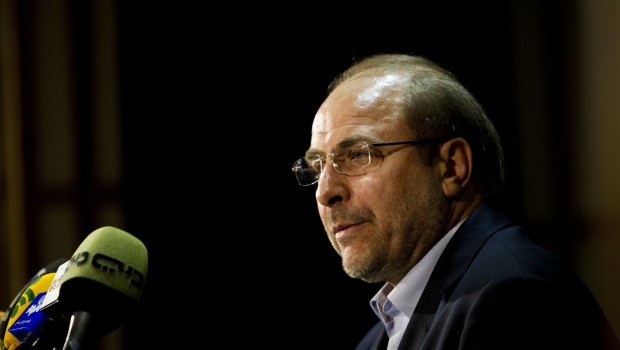
Mayor of Tehran, Iranian Mohammad Baqer Qalibaf speaks during a press conference after registering his candidacy for the upcoming presidential election at the interior ministry in Tehran on May 11, 2013. Source: AFP Photo/Behrouz Mehri
At the age of 19, Qalibaf participated in the Iran–Iraq War and was soon appointed commander of a division despite his youth. After the war, he was appointed the deputy commander of the Resistance Force and Basij troops, and began climbing the ranks of the Iranian Revolutionary Guard Corps (IRGC).
Qalibaf was appointed in the mid-1990s as the head of the Khatam Al-Anbia, an engineering firm affiliated to the IRGC. The influential company is now considered the largest government contractor in industrial and development projects in Iran.
The policeman
Following student protests in July 1999, Iran’s supreme leader, Ali Khamenei, named Qalibaf as the chief of the police forces. He initiated reforms and began an overhaul of the force, including the introduction of Police-110, a specialist unit that can be deployed immediately at the request of citizens.
He also introduced new technologies and policing methods to make the police more accessible to the general public. In addition, he served as the special representative of the then-president of Iran, Mohammad Khatami, in the Office of the Campaign against Smuggling Goods and Foreign Currency.
In June 2003, a protest by students at Tehran University against the privatization of universities set off a wave of unrest. Qalibaf was one of the commanders who sent a letter to Khatami, saying that they would take matters into their own hands if he did not restore order.
On April 5, 2005, Qalibaf resigned his military posts (including in the police forces) due to his intention to run for the presidency of Iran. During his campaign, some recordings in which he had boasted about his involvement in the crackdown on student unrest during his tenure as the chief of police came to light, damaging his popularity.
Mayoralty
In 2005, Qalibaf was a candidate in the Iranian presidential election, but he was beaten by Ahmadinejad despite being supported by some conservative factions. Qalibaf came fifth in the election. After his defeat, he inherited the Tehran mayoralty from Ahmadinejad, with the Tehran City Council electing him to the post in September 2005 by 8 votes to 7.
His tenure as mayor of Iran’s capital city has reportedly been a successful one. Qalibaf was re-elected by the Tehran City Council in May 2007, a predictable move based on his popularity and record in office. In 2008, the “World Mayor” website ranked Qalibaf as the eighth-best mayor in the world, out of more than 800 mayors.
Dialogue with the US
On October 13, 2008, Qalibaf announced his support for dialogue with the United States, following indications from US president Barack Obama that he would be open to speaking with Iran. “I think the world community, Iranian society and US society would benefit from such talks,” he told reporters during a visit to Tokyo at the invitation of the Japanese government, AFP reported.
In an interview with Iran’s Tasnim news agency in April 2013, Qalibaf said that “negotiations are not taboo, nor will they solve all of the problems. Negotiations are a tool. When it is necessary, we will certainly negotiate with America. Negotiating with America has never been a red line for us.”
The nuclear issue
Qalibaf believes that the nuclear issue is Iran’s most important foreign policy concern. “The nuclear case is a national and major case that all the administrations will follow within the framework of the system,” he said during an interview with Tasnim news agency. Nonethless, Qalibaf does not rule out a diplomatic approach, which he believes he would perform better than Ahmadinejad.
In a reference to Ahmadinejad’s controversial rhetoric and actions, Qalibaf said that “steps were taken and words were said that not only did not help us push our programs forward, but it also gave our opponents the opportunity to gather others against us. Controversial but useless remarks and slogans and presentations struck a blow against us and weakened our rightful position.”
2013 presidential elections
Qalibaf did not run for the presidency in the 2009 elections.
He is part of the 2+1 Coalition of conservative loyalists, along with Ali Akbar Velayati, a senior foreign policy adviser to Iran’s supreme leader, and senior lawmaker Gholam Ali Haddad Adel. According to Press TV, unconfirmed reports say Qalibaf was regarded as the man most likely to emerge as the frontrunner, after which the other two candidates from that coalition would drop out of the race and endorse him. However, recent reports suggest that this may no longer be the case, and that all three men may now run campaigns.
In terms of the electoral coalition he has sought to assemble, Qalibaf has concentrated on both the urban middle class population as well as poor rural citizens. He presents himself as an effective and serious manager, and points to his record of overseeing successful projects in Tehran over the last eight years.
Timeline
• 1961: Born near the north-eastern city of Mashhad.
• 1996: Awarded the rank of major-general in Iran’s Revolutionary Guard Corps after successfully completing a master’s degree in geopolitics.
• 1998: Named commander of the Islamic Revolutionary Guard Corps Air Force.
• 1999: Appointed by Supreme Leader Ali Khamenei as the head of Iran’s police forces.
• 2001: Receives a PhD in geopolitics from Tarbiyat Modarres University.
• 2005: Resigns from the military in order to run for the presidency.
• 2005: Elected by Tehran City Council as the 57th mayor of Tehran.
• 2008: Announces his support for dialogue with the United States.
This article is part of a series of Asharq Al-Awsat profiles of the Iranian presidential candidates
